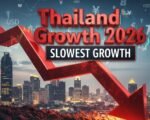Western Canada’s most influential business voices are sending a pointed message to the country’s leaders: get your act together, or risk missing the boat on economic growth. But as premiers from Alberta to British Columbia gather in Yellowknife this week, the picture is anything but united.
Tensions are brewing just below the surface. While industry leaders are trying to sound like a choir, the politicians sound more like they’re warming up in separate rooms.
Big Ask from Business: Cut Red Tape, Scrap Emissions Cap
It wasn’t subtle. On Tuesday, the Western Business Coalition — a heavyweight bloc representing over a third of Canada’s economy — told Ottawa what they want: fewer taxes, less red tape, and a firm “no” to the proposed emissions cap on oil and gas.
The coalition spans key sectors — agriculture, energy, mining, and transport. Their message? They’re tired of competing with one arm tied behind their back.
At the centre of the ask is a growing frustration that federal climate policy is out of step with Western economic realities. It’s not that these leaders are anti-environment. But they’re convinced the proposed emissions cap will put Western Canada’s most vital industries in a chokehold.
“We can’t build a modern economy while we’re constantly fighting our own government,” said one executive with a major energy firm in Calgary, who requested anonymity to speak freely.

Premiers Pulled in Different Directions
If the business community is speaking with one voice, Western premiers are not.
Danielle Smith of Alberta and Scott Moe of Saskatchewan are dialling up pressure for more oil pipelines — and neither is backing away from the threat of secessionist politics. Both have openly discussed loosening the rules around referendums, which could make it easier for disgruntled citizens to vote on something as extreme as leaving Canada.
Smith’s position is particularly stark. She argues that without new pipelines to the Pacific, national unity could face its biggest test since the Quebec crisis in the 1990s.
“It’s pipelines or separatism,” a senior Alberta government staffer bluntly summarized. It may sound like political posturing — but in Alberta, that kind of rhetoric still draws crowds.
At the same time, B.C.’s David Eby and Manitoba’s Wab Kinew — both NDP premiers — are offering a calmer voice. They’ve been quick to wave off talk of secession, instead urging co-operation and a focus on transition rather than confrontation.
Industry Unity Isn’t Translating Into Politics
It’s a strange dynamic: business leaders are aligned in their demands, but the premiers can’t seem to find common ground.
A source close to the Western Business Coalition said they had hoped to see a united political front emerge from this week’s summit in Yellowknife. Instead, the premiers are arriving with different priorities and, in some cases, simmering resentment.
A few quick facts underline the gap:
-
Alberta and Saskatchewan continue to push back hard on federal climate rules
-
British Columbia is more focused on sustainable development and LNG exports
-
Manitoba is in transition under Premier Kinew, and hasn’t staked out a hardline position yet
Meanwhile, Northern premiers like Caroline Cochrane of the Northwest Territories are bringing their own urgent issues to the table — infrastructure, Arctic sovereignty, and Indigenous reconciliation.
The Numbers Driving the Debate
To really understand what’s going on, you’ve got to look at the economics. Here’s a look at how Western Canada stacks up in terms of economic contribution and emissions:
| Province | % of Canada’s GDP | Primary Industry | CO2 Emissions (2023 est.) |
|---|---|---|---|
| Alberta | 16.5% | Oil & Gas | 275 megatonnes |
| British Columbia | 13.2% | Forestry, LNG | 64 megatonnes |
| Saskatchewan | 5.7% | Potash, Oil, Agriculture | 74 megatonnes |
| Manitoba | 3.2% | Hydro, Agriculture | 21 megatonnes |
That’s a big chunk of the national economy — but also a hefty portion of the country’s carbon output. The balancing act between growth and emissions is front and centre here, and it’s not going away anytime soon.
Ottawa Stays Quiet, But Tensions Simmer
So far, federal officials have stayed mostly silent as the premiers hash things out in the North. But behind closed doors, Ottawa is watching closely.
Senior Liberal insiders have privately admitted concerns over the tone coming out of Alberta and Saskatchewan. There’s fear that a vocal minority pushing for more autonomy — or even independence — could hijack the national conversation.
But others say this is just political theatre — useful for provincial leaders looking to score points back home, especially when the federal government is unpopular in the West.
Still, it’s hard to ignore how far things have shifted. Ten years ago, even talk of separatism was fringe. Now, it’s creeping into mainstream political platforms.
Is a Common Front Still Possible?
Some still hold out hope.
One business leader attending the Yellowknife summit said the economic logic for cooperation is just too strong to ignore. “At some point, the premiers will realize they’re stronger together,” he said. “Otherwise, we’re just fighting over the same pie while others get bigger ones.”
But for now, it’s clear the path to a unified Western voice is cluttered with political tripwires. The next few days in Yellowknife might offer a hint of what’s to come — but don’t expect miracles.








